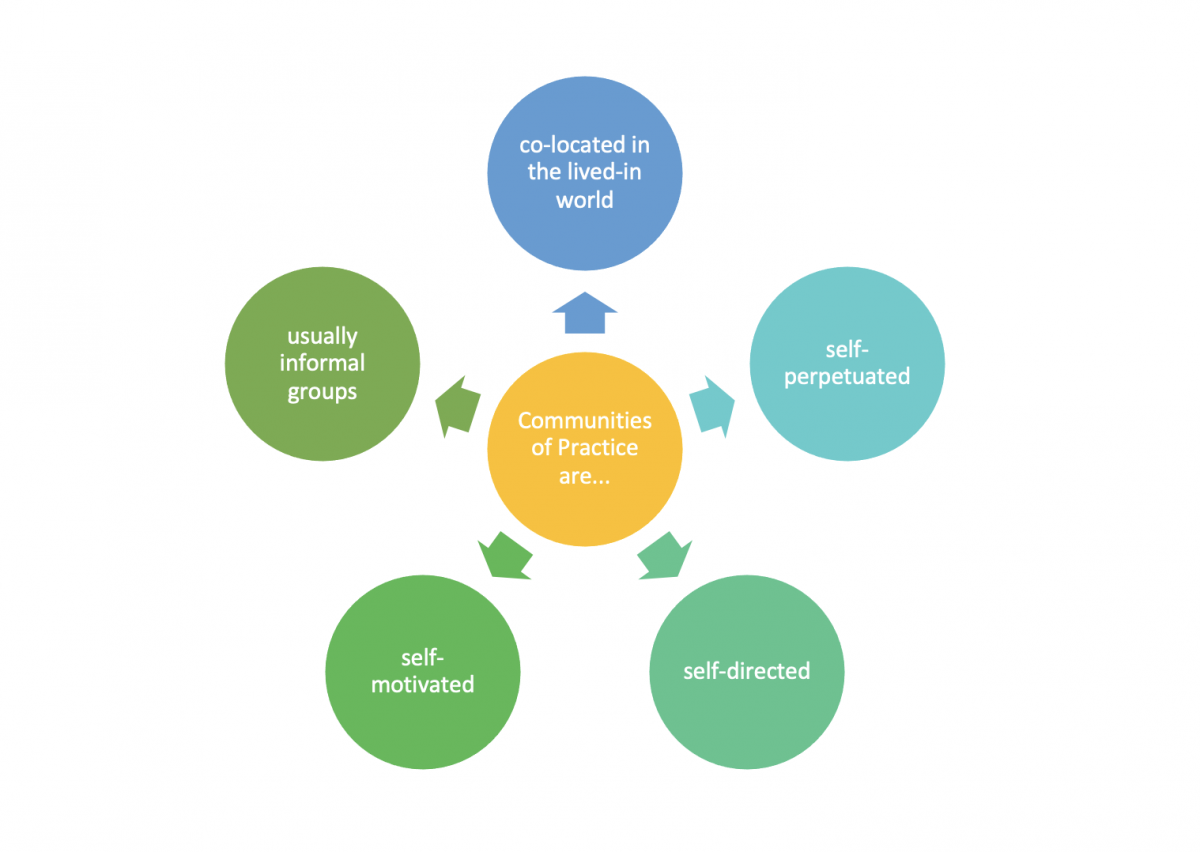
Image courtesy of rawpixel.com via Freepik
What is a Community of Practice?
Are you looking to interact with people who are interested in Open Education Resources (OER)? Do you have ideas that you want to share with a wider audience and learn more about OER? A Community of Practice (CoP) might be the right place for you.
The term ‘Community of Practice’ was created by Etienne Wenger, who offers a social theory of learning – a school of thought that proposes that humans can acquire new ideas and behaviours by observing others. The term has been used in various ways, and usually refers to informal networks that support people to develop shared meaning and engage in knowledge building.[1] A CoP is a group of individuals who share a domain of interest, which they use as a basis for interaction. Members of a CoP for OER might share resources, experiences, problems and solutions, tools, and methodologies. This results in members gaining knowledge from one another and, by extension, contributes to the development of knowledge within the domain of OER and the field of Open Educational Practices (OEPs) more broadly.[2]
A CoP is a great way to conduct advocacy and gain momentum for OER at your institution, within your organisation, or in your social circle. Some CoPs may involve projects like developing an OER strategy or distributing OER grants at an institution, while others may simply be aimed at knowledge sharing.
OER Africa published a report on CoPs, which is accessible here. Parts of this article are based on the report.
According to the report, CoPs have several defining characteristics, as illustrated in the graphic below.

Source: Hoosen, S. (2009). Communities of Practice: A research paper prepared by OER Africa
Important to note is that CoPs can take different forms and they vary across different dimensions; for example, they can be small and tight knit or large and loosely connected. The concept of virtual CoPs has gained increasing popularity as technology and the Internet open opportunities for faster and alternative means of communication with people who are geographically far away from each other. They have also become a very practical means of interacting with people who are interested in a particular subject field since the outbreak of the COVID-19 pandemic and the restrictions it has created on face-to-face interaction and travel.
You can access more resources on CoPs here.
How do I set up a CoP for OER?
The success of a CoP ultimately depends on preparation and involves consideration of a number of key aspects.
- Identify the scope and focus of the CoP for OER: Answer the following questions such as ‘What is the value proposition of the CoP?’ and ‘What will its scope be?’
- Build a case for action: Consider the purpose of the CoP and outline key deliverables over the next one to two years, as well as how the CoP will contribute to the OER movement. Think about how the CoP will satisfy members’ expectations.
- Identify a CoP facilitator: Since relationships are central to one’s sense of community, a facilitator is central to creating and maintaining a robust CoP. The facilitator should have sufficient time available to dedicate to the CoP and should be motivated, creative, and knowledgeable about OER. The facilitator will be responsible for organising meetings, maintaining and distributing knowledge resources, and monitoring the effectiveness of the CoP.
- Identify potential members and criteria for membership: Consider who the best people are to be part of the CoP. It might be useful to think about how to introduce diversity into the group through broad membership, so that there are wide-ranging perspectives. Depending on the scope of the CoP, you might consider approaching anyone from OER practitioners and advocates to librarians and institutional management.
- Highlight the benefits of joining the CoP to potential members: Benefits include faster solutions, reducing duplication of efforts, and enabling people to develop and share new ideas or strategies around OER promotion.
- Identify potential knowledge to share: Get community members to identify knowledge that would be useful to share.
- Decide on an initial technology platform: The platform/s should enable the group to communicate effectively and store resources. They should be easily accessible to all members.
- Consider how the CoP will be governed: Establish clear rules for decision-making and accountability, as well as what resources are available, what the key milestones or deadlines are, and who the stakeholders are, to name a few.
Once you have done the background preparation, you can start planning the official launch of your CoP. At the launch, it is good practice to develop a community charter. Thereafter, the CoP should determine the roles and responsibilities of community members, initiate events and spaces (such as meetings or OER advocacy activities), build a core group to drive the CoP, and find and share knowledge. Once you have passed the initial phase, here are some tips on ensuring that your CoP is effective and sustainable.
How do I find people who are interested in OER?
Struggling to find people who are interested in your preferred subject area? Here are some options for you to consider:
- Reach out to your network: It can be surprising how you might share a common interest in OER with people in your network – even if you haven’t discussed it with them before. They might even be able to put you in contact with someone they know who is interested in OER or looking to gain knowledge.
- Search on LinkedIn: One of the benefits of LinkedIn is that you can search for keywords and come across thought leaders, organisations, different stakeholders, or people with a general interest in OER. You can strike up a conversation by sending a message on LinkedIn.
- Do your research: Use a search engine to look for resources and websites with information about OER. Find out who is producing this knowledge and approach them to gauge their interest in being a CoP member.
Access the links below to see some CoPs for OER, and OEPs more broadly, in action:
- Teacher Education in Sub-Saharan Africa
- OER Commons: Open Education Community of Practice
- BC Open Educational Technology Collaborative
- Community College Consortium for Open Educational Resources
Ultimately, developing a CoP for OER is a wonderful way of learning, sharing knowledge, and advocating for OER use. As long as you maintain a clear sense of the scope of your CoP and ensure that all of the CoP’s activities contribute to its case for action, it can make a valuable contribution to the OER movement.
[1] Hoosen, S. (2009). Communities of Practice: A research paper prepared by OER Africa. Retrieved from https://www.oerafrica.org/resource/oer-africa-communities-practice
[2] Gannon-Leary, P. and Fontainha, E. (2007). Communities of Practice and virtual learning communities: benefits, barriers and success factors. eLearning Papers. Retrieved from https://www.oerafrica.org/resource/communities-practice-and-virtual-learning-communities-benefits-barriers-and-success-factors
For more articles in this series, click on the links below.
- Do you want to communicate your research more widely? (19 January 2021)
- How can you get involved in the Open COVID Pledge for Education? (9 December 2020)
- How can governments and institutions operationalize the OER Recommendation? (19 November 2020)
- How can you use MOOCs in your teaching? (21 October 2020)
- Online assessment: How do we know if students are learning? (18 September 2020)
- UNESCO’s OER Recommendation Dynamic Coalition Consultations: The way forward (26 August 2020)
- The Open COVID Pledge for Education (12 August 2020)
- How can OpenCourseWare help you to improve your courses? (16 July 2020)
- Evaluating Open Content (2 July 2020)
- Adapting Open Content (25 June 2020)
- Sharing Africa’s knowledge through open data (18 June 2020)
- Sharing Africa’s knowledge through openly licensed publishing (11 June 2020)
- Podcast: OER and their Relevance to the COVID-19 pandemic (5 June 2020)
- Sharing Africa’s knowledge through open African research repositories (29 May 2020)
- Emergency Remote Teaching Webinar Series – All resources available (18 May 2020)
- OER Repositories in Africa (8 May 2020)
- How to Find Open Content (30 April 2020)
- Online (and offline) reading resources for children (23 April 2020)
- Showcasing OER Platforms: OER Africa (15 April 2020)
